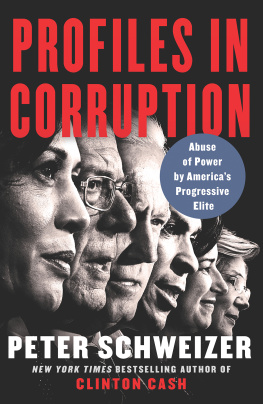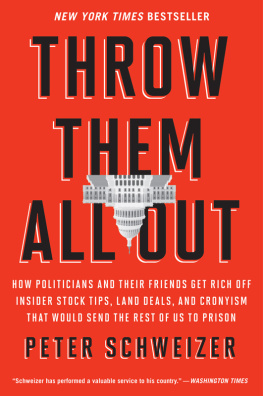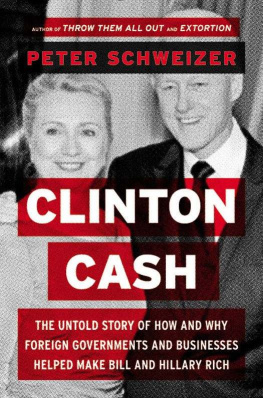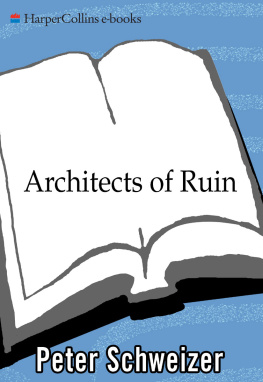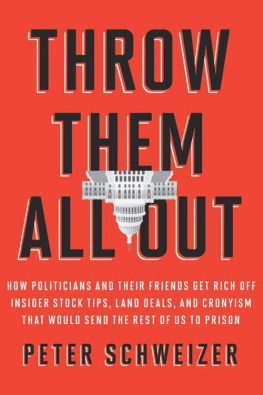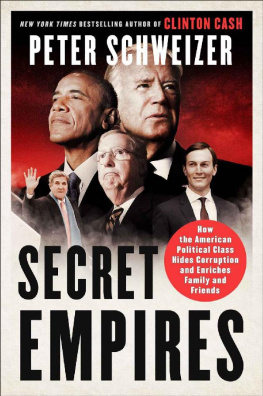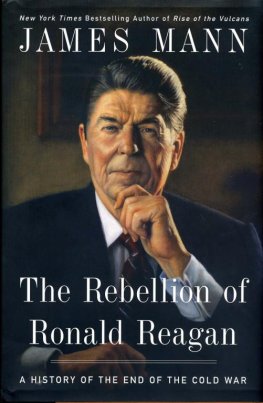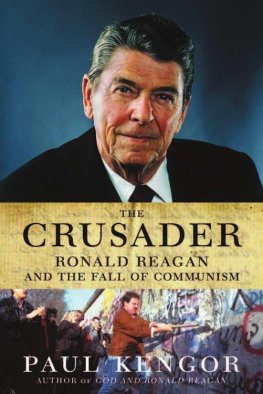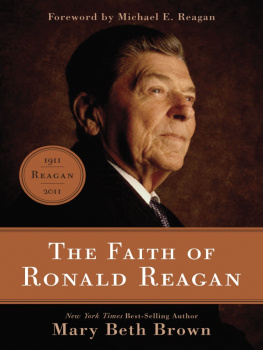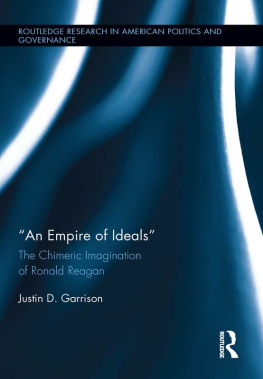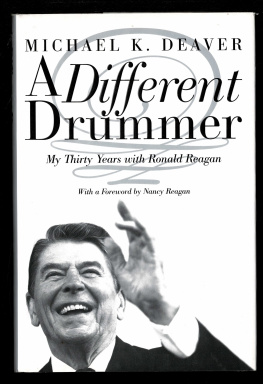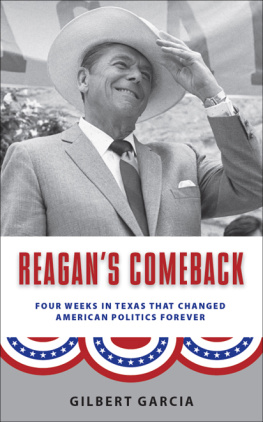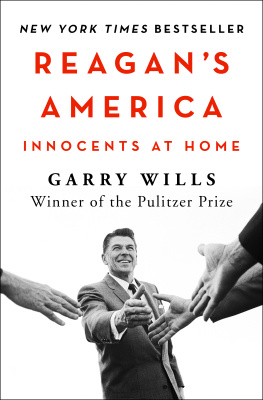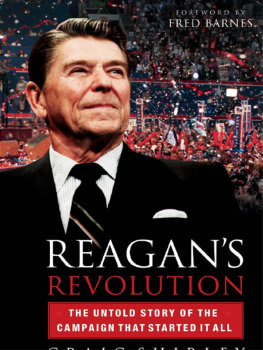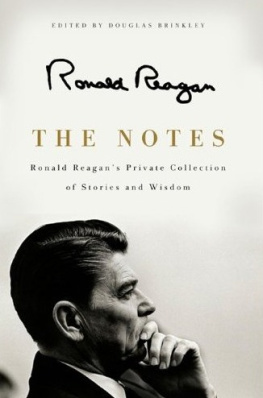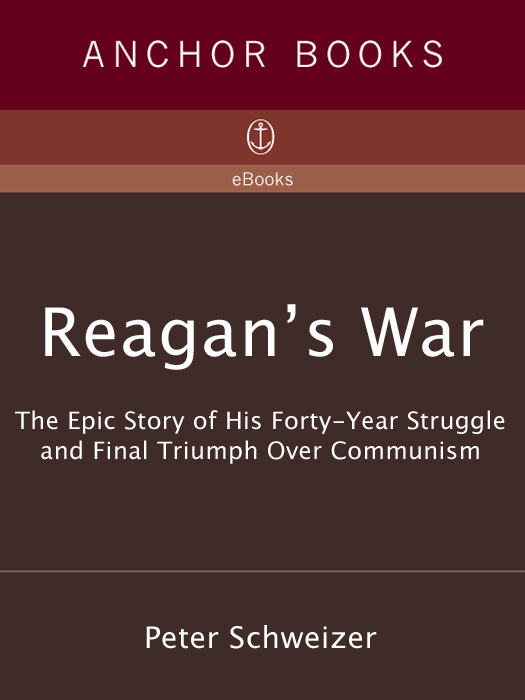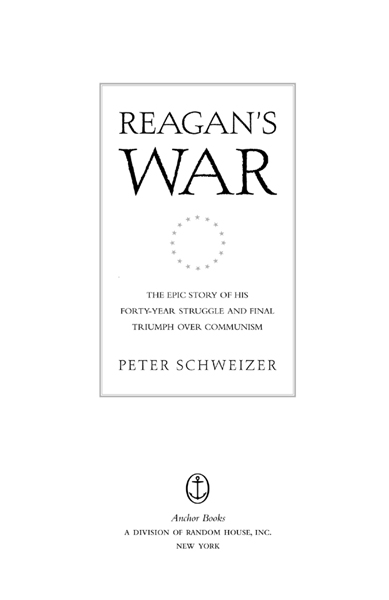PRAISE FOR P ETER S CHWEIZERS
REAGANS WAR
Peter Schweizer has written a profound and important book which is also compulsive reading. The Ronald Reagan he depicts is a man utterly consistent in his beliefs and analysis from his earliest forays into politics. While others were distracted by short-term considerations, President Reagan single-mindedly pursued his vast strategic goalsand he succeeded. Was there ever a better example of statesmanship in action?
Lady Margaret Thatcher
Ronald Reagan played an invaluable role in bringing about the fall of communism and ending the Cold War without resorting to military solutions. Without his great political sense and prudence, instead of the popping of champagne corks, the world would have heard real artillery shots. We [in the Solidarity movement] sensed President Reagans support and understanding and never had to ask for or demand it. This is not something easily found in the world of politics.
Lech Walesa, former president of Poland
In Reagans War, Peter Schweizer has given us a timely and skilled history of Ronald Reagans forty-year struggle against communism that brings home the twin beacons he followed: we must be guided not by fear but by courage and moral clarity. This is a superb history that demonstrates why Reagan won the Cold War, and why it never would have been won without him.
Caspar W. Weinberger, Chairman, Forbes, Inc.
A masterstroke. Schweizer uses the secret archives of the Soviet Union and its satellites to outline with amazing detail the seriousness of the Soviet threat, the failures of the American establishment, and the brilliance of Reagans strategy for victory. If you want to understand how we can win the war against Islamic extremists, study how Reagan achieved victory over communism in Reagans War.
Newt Gingrich, former Speaker of the House
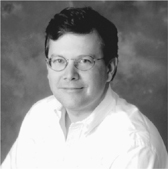
Peter Schweizer
Reagans War
Peter Schweizer is a fellow at the Hoover Institution on War, Revolution and Peace at Stanford University. His other books include The Bushes: Portrait of a Dynasty (with Rochelle Schweizer); The Fall of the Wall: Reassessing the Causes and Consequences of the End of the Cold War; The Next War, coauthored with Caspar Weinberger; Victory; and Friendly Spies. He lives in Florida with his wife and children.
ALSO BY PETER SCHWEIZER
The Bushes: Portrait of a Dynasty
The Fall of the Wall: Reassessing the Causes and Consequences of the End of the Cold War
The Next War (with Caspar Weinberger)
Victory
Friendly Spies
First Anchor Books Edition, October 2003
Copyright2002 by Peter Schweizer
All rights reserved under International and Pan-American Copyright Conventions. Published in the United States by Anchor Books, a division of Random House, Inc., New York, and simultaneously in Canada by Random House of Canada Limited, Toronto. Originally published in hardcover in the United States by Doubleday, a division of Random House, Inc., New York, in 2002.
Anchor Books and colophon are registered trademarks of Random House, Inc.
The Library of Congress has cataloged the Doubleday edition as follows:
Schweizer, Peter, 1964
Reagans war : the epic story of his forty-year struggle and final triumph over communism / Peter Schweizer.1st ed.
p. cm.
eISBN: 978-1-4000-7556-0
1. Reagan, RonaldViews on international relations. 2. Cold War. 3. United StatesForeign relationsSoviet Union. 4. Soviet UnionForeign relationsUnited States. I. Title.
E877.2.S35 2002
2002067393
Author photographJo Shoupe
www.anchorbooks.com
v3.1
Dedicated to the memory of my father

ERWIN V. SCHWEIZER
W HAT IS THE USE OF LIVING IF IT BE
NOT TO STRIVE FOR NOBLE CAUSES AND
TO MAKE THIS MUDDLED WORLD A BETTER
PLACE FOR THOSE WHO WILL LIVE IN
IT AFTER WE ARE GONE?
Winston Churchill

CONTENTS
CHAPTER I
ONE-MAN BATTALION
CHAPTER II
YOU TOO CAN BE FREE AGAIN
CHAPTER III
PILES OF CARDS IN RUBBER BANDS
CHAPTER IV
A BULLET WITH HIS NAME ON IT
CHAPTER V
THE DEAL
CHAPTER VI
FIRE AND HEAT MAKE STEEL
CHAPTER VII
MOVING FORWARD
CHAPTER VIII
ATHENS OR SPARTA?
CHAPTER IX
NOT ENOUGH STATURE
CHAPTER X
EXPLOSIONS
CHAPTER XI
WORD AND DEED
CHAPTER XII
THE HAND OF GOD
CHAPTER XIII
THEY CANT KEEP UP
CHAPTER XIV
A PLAN
CHAPTER XV
THE CHANCE OF A LIFETIME
CHAPTER XVI
THE CRUSADE
CHAPTER XVII
REVERSAL OF FORTUNE
CHAPTER XVIII
STUBBORN RESISTANCE
CHAPTER XIX
ALL IN THE NAME OF PEACE
CHAPTER XX
REAGAN MAKES GORBACHEV POSSIBLE
CHAPTER XXI
THE AGING LION VS. THE YOUNG TIGER
CHAPTER XXII
THE TRAP
CHAPTER XXIII
FREEDOM TOUR
CHAPTER XXIV
GOODBYE
ACKNOWLEDGMENTS
MANY PEOPLE MADE THIS BOOK POSSIBLE IN A VARIETY OF WAYS. William M. Arkin, John Koehler, Lloyd Billingsley, Professor Paul Kengor, Roger Robinson, Bill Lee, Chris Lay, Mark Kramer, and Marc Thiessen all passed along information and suggestions that proved enormously helpful. I am also deeply grateful to those individuals on both sides of the Cold War divide who agreed to interviews over the past eight years.
This book includes material from numerous archives around the world in Russia, Germany, the Czech Republic, Poland, and Hungary. In the United States, I particularly wish to thank the Hoover Institution Archives, Stanford University; the International Cold War History Project; Naval Historical Center; Young Americas Foundation; and the National Security Archives. I am also thankful for the assistance provided by the Ronald Reagan Presidential Library.
Thanks also to Nancy Reagan, who allowed me to use photos from the familys private photo collection.
At the Hoover Institution Archives, I received tremendous research assistance and translation help, and I wish to thank Elena Danielson, Maciej Siekierski, Zbigniew Stanczyk, and Irene Czernichowska for their help in these areas.
Considerable resources went into researching this book, and I am indebted to Owen and Bernadette Smith, who supported this project from the beginning, Richard Parillo, who provided critical funds for the collecting of the documents and research material, and the Richard M. Scaife End of Communism Initiative at the Hoover Institution, which offered support that made the completion of this project possible.
As a research fellow, I am enormously thankful for the many colleagues and friends who have provided help and encouragement over the past few years. In particular, I would like to thank John Raisian, Charles Palm, Richard Sousa, and Tom Henriksen, who never seem to tire of my phone calls and questions.


